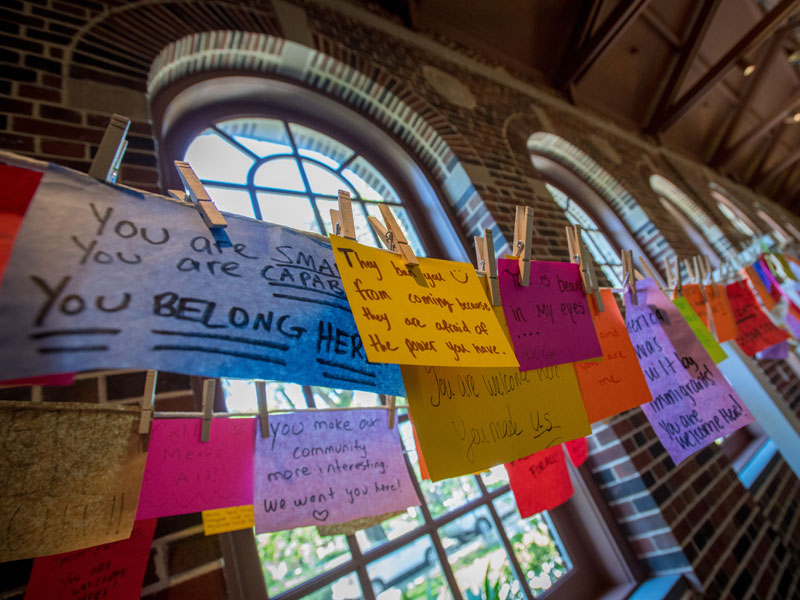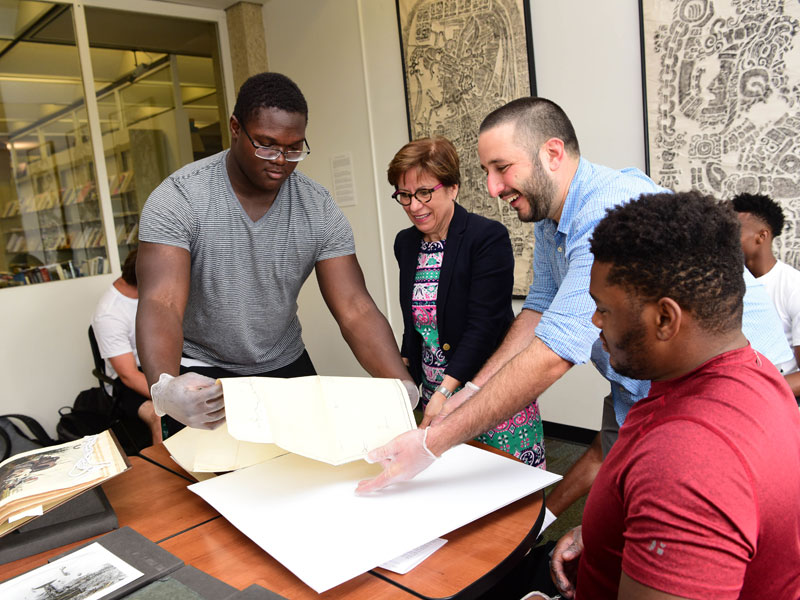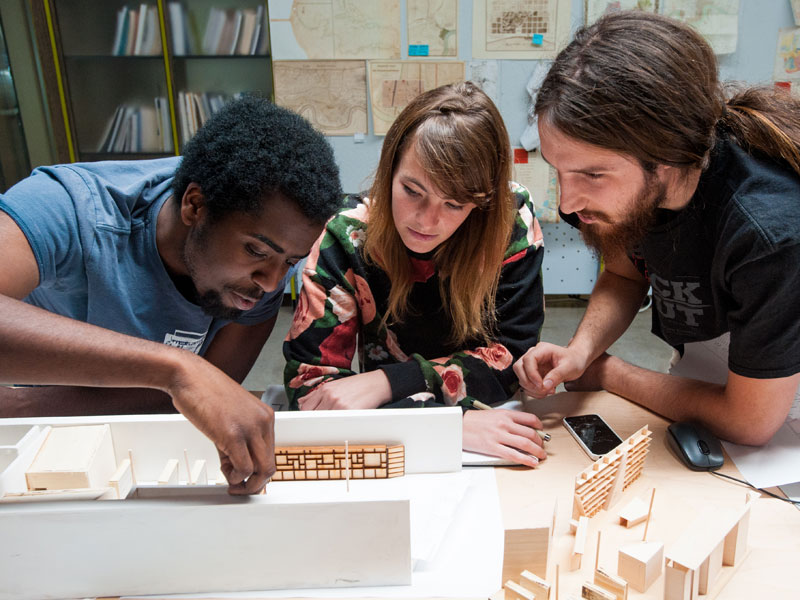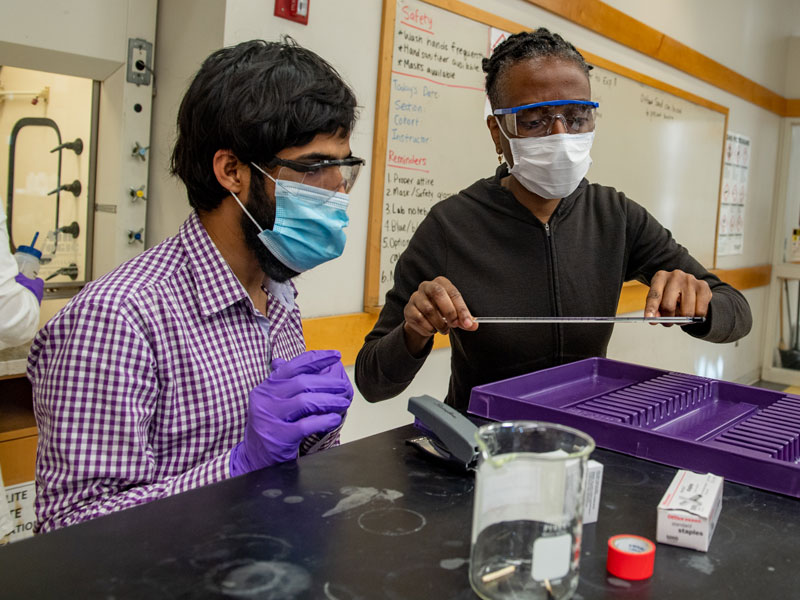Over the past several years, we have made great progress together, but we know we must do more. Below are the areas of focus we are dedicated to in our effort to ensure we are an inclusive community where all of our student, faculty, and staff community members feel a strong sense of belonging and can thrive in bias-free environments.
Assessing Campus Climate to Drive Culture
 We engage in regular qualitative and quantitative climate assessments (of bias, discrimination, and harassment related to race, ethnicity, gender, sexuality, disability, social class, veterans, and more) to ensure we have continuing knowledge of how students, staff, faculty, and administrators experience and experience our community.
We engage in regular qualitative and quantitative climate assessments (of bias, discrimination, and harassment related to race, ethnicity, gender, sexuality, disability, social class, veterans, and more) to ensure we have continuing knowledge of how students, staff, faculty, and administrators experience and experience our community.
We inventory our campus to build and collaborate our collective work on inclusive community across campus to identify strengths and address gaps.
We integrate this climate assessment data throughout all of our campus change strategies to develop accountability for creating a campus climate that is accessible for all who live, learn, and work at Tulane.
We partner with schools and shared service units as they engage in their work to assess unit strategic efforts, climate and culture change, and ensure alignment of their inclusive community efforts with Tulane’s overall goals to reduce inequities, create and sustain an inclusive community, and increase accountability.
Committing to and Sustaining Racial Equity
 We lead the President’s Commission on Racial Equity, Diversity, and Inclusion to identify high-priority issues and vigilantly build a racially equitable campus through our “Plan for Now” and “A Strategy for Tomorrow”. A top priority of the Commission is to create a Tulane culture that proactively addresses systemic, interpersonal, and intrapersonal racism and fosters the commitment of every Tulane community member to address racism in every context of the university.
We lead the President’s Commission on Racial Equity, Diversity, and Inclusion to identify high-priority issues and vigilantly build a racially equitable campus through our “Plan for Now” and “A Strategy for Tomorrow”. A top priority of the Commission is to create a Tulane culture that proactively addresses systemic, interpersonal, and intrapersonal racism and fosters the commitment of every Tulane community member to address racism in every context of the university.
We coordinate the President’s EDI Initiative Committee to create new, evidence-based programs and expand existing support for students of color.
We develop racial equity leadership programs and collaborate with the campus on the implementation of these programs so our faculty, staff, and students acquire essential awareness, knowledge, and skills to understand and address systemic racism.
We lead strategic planning efforts on racial equity in collaboration with schools and shared service units to benchmark, assess, and implement racial equity initiatives effectively.
We partner with key faculty governance and other constituencies to identify ways to combat racism inside and outside the classroom and infuse key knowledge about racial equity in the curriculum.
Promoting Faculty, Staff, and Student Inclusive Academic Excellence
 We lead professional development efforts to ensure underrepresented faculty, staff, and students have access to our university so that our campus reflects the inclusive excellence of our larger world.
We lead professional development efforts to ensure underrepresented faculty, staff, and students have access to our university so that our campus reflects the inclusive excellence of our larger world.
We collaboratively review and develop policies, procedures, and practices to guide access, retention, and advancement of faculty and staff to increase compositional diversity.
We review policies and practices to ensure access to resources and opportunities across the institution to underrepresented faculty, staff, and students.
We expand resources and support to minoritized faculty, staff, and student communities through ALAAMEA and the EDI Initiatives Committee, working with campus constituent groups, including our students, faculty, and staff, ad hoc committees, and informal advisory groups to protect minoritized faculty, staff, and students from the burden of navigating and surviving inequities and move toward resilience and thriving in our campus community.
We provide professional development on supporting inclusive academic excellence that supports the full participation of faculty and staff who have the awareness, knowledge, and skills to support minoritized community members and build communities committed to addressing and reducing inequities in their units and sustaining an inclusive community at Tulane.
We engage in broad work with constituencies within and outside of the classroom, such as alumni, donors, and our surrounding communities - to ensure inclusive community values and action in our work.
Creating Inclusive Learning Environments
 We value a culture of shared governance, and work closely with University Senate, Deans, Department Chairs, and Program Coordinators, faculty, staff, and other ad hoc committees and informal advisory groups to provide evidence-based best practices for inclusive academic excellence in the curriculum, co-curriculum, experiential learning, and service learning.
We value a culture of shared governance, and work closely with University Senate, Deans, Department Chairs, and Program Coordinators, faculty, staff, and other ad hoc committees and informal advisory groups to provide evidence-based best practices for inclusive academic excellence in the curriculum, co-curriculum, experiential learning, and service learning.
We partner and consult with key faculty, staff, and student constituencies to identify ways to level up attention to inclusive academic excellence across all academic programs and social learning activities.
Developing Equity-Minded Research Environments
 We partner with key faculty constituencies to increase research mentorship programs for minoritized faculty and students seeking internal and external grants and awards.
We partner with key faculty constituencies to increase research mentorship programs for minoritized faculty and students seeking internal and external grants and awards.
We collaborate to provide professional development on best practices for EDI research.
We support grant submissions that address inclusive community and campus inequities and reduce bias, prejudice, and harm.
We lead and collaborate on regular campus climate assessments that inform inclusive community research strategies on campus that promote a strong sense of belonging for our community members.
We consult with campus units and community partners to support intercultural research networks and community-based action research in New Orleans, the Gulf Region, and global contexts.
Engaging in Intercultural Outreach and Community Partnership
 We collaborate with surrounding community partners to provide educational and professional development on our inclusive community value.
We collaborate with surrounding community partners to provide educational and professional development on our inclusive community value.
We partner with alumni relations, donor development, communications, and other key groups to increase awareness, knowledge, and skills in enhancing inclusive community.
We support initiatives that help us understand the history of racial equity and other intersecting systems of inequities at Tulane, in New Orleans, the Gulf Region, and global contexts and reduce the harm of these inequities.
We consult with key partners on campus in their work to increase access for underrepresented vendors and suppliers.
